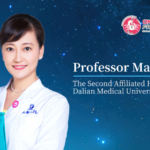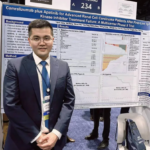
Editor’s Note: The European Association for the Study of the Liver (EASL) Annual Meeting was successfully held in Milan, Italy, from June 5 to 8, 2024. During the conference, four research posters from Professor Wei Lu 's team at the Hepatobiliary Tumor Department of Tianjin Medical University Cancer Institute and Hospital were presented. These studies cover the fields of liver cancer, cholangiocarcinoma, and liver cirrhosis. This report provides an overview of their findings for our readers.Study One: The Role of HLA DR+ CD4+ T Cells in the Effect of Lactobacillus delbrueckii on Liver Cirrhosis
This study utilized Mendelian randomization to discover a causal relationship between Lactobacillus delbrueckii in the gut microbiota and liver cirrhosis. Further analysis indicated that Lactobacillus delbrueckii impacts liver cirrhosis by affecting HLA DR+ CD4+ T cells. This finding reveals the immunomodulatory role of Lactobacillus delbrueckii, providing a new theoretical basis for the treatment and prevention of liver cirrhosis. The study offers significant scientific evidence for developing Lactobacillus delbrueckii-related treatments for liver cirrhosis and explores new avenues for personalized treatment and intervention.
Study Two: The Role of CD27 on IgD+ CD24+ B Cells in the Impact of Lactobacillus on Cholangiocarcinoma
Using Mendelian randomization, this study explored the causal relationship between gut microbiota, cholangiocarcinoma, and potential immunophenotypic regulatory factors. Results indicated a causal relationship between Lactobacillus and cholangiocarcinoma, with CD27 on IgD+ CD24+ B cells playing a crucial role in this effect. Further research found that CD27 on IgD+ CD24+ B cells is significant in the immunomodulatory effect of Lactobacillus on cholangiocarcinoma. This discovery provides a new mechanism for understanding Lactobacillus’s role in cholangiocarcinoma and identifies CD27 on IgD+ CD24+ B cells as a potential target for future immunotherapy. The study lays a foundation for further mechanistic exploration.
Study Three: Clinical Efficacy of HAIC (FOLFOX) Combined with Tyrosine Kinase Inhibitors and PD-1 Inhibitors Versus HAIC Combined with Bevacizumab and PD-1 Inhibitors in Treating Advanced Hepatocellular Carcinoma
This study aimed to evaluate the clinical efficacy of FOLFOX-HAIC combined with tyrosine kinase inhibitors (TKIs) and programmed cell death protein-1 (PD-1) inhibitors versus FOLFOX-HAIC combined with bevacizumab and PD-1 inhibitors in treating advanced hepatocellular carcinoma (HCC). A total of 133 HCC patients were included. Results showed that FOLFOX-HAIC combined with bevacizumab and PD-1 inhibitors improved tumor response and was more likely to extend overall survival and progression-free survival compared to FOLFOX-HAIC combined with TKIs and PD-1 inhibitors. This study provides evidence-based support for optimizing first-line treatment for advanced liver cancer.
Study Four: A Two-Sample Mendelian Randomization Analysis of the Association Between Liver Cancer and Plasma Metabolites
This study evaluated the potential causal relationship between human plasma metabolites and hepatocellular carcinoma (HCC) risk using Mendelian randomization. The analysis identified 24 plasma metabolites potentially associated with HCC risk, including various lipid metabolites and other metabolic products. These findings support the potential causal relationship between plasma metabolites and HCC risk, providing direction for future molecular mechanism studies and important clues for exploring potential therapeutic and preventive strategies.
Conclusion
The research presented by Professor Wei Lu ‘s team at EASL 2024 spans gut microbiota, immunophenotypes, cholangiocarcinoma, and HCC treatment, providing new evidence-based medicine and research directions for the diagnosis and treatment of hepatobiliary diseases. These findings offer valuable references for clinical practice.
Expert Profiles
Professor Wei Lu
- Chief Physician, Doctoral Supervisor
- Tianjin Medical University Cancer Institute and Hospital
- Party Secretary of Tianjin Cancer Hospital Airport Hospital
- Director of the Liver Cancer Prevention and Treatment Research Center, Tianjin Medical University Cancer Institute and Hospital
- Recipient of the State Council Special Government Allowance
- Party Secretary and Vice Chairman of the Chinese Anti-Cancer Association
- Chairman of the Liver Cancer Committee of the Chinese Anti-Cancer Association
- Standing Member of the Chinese Medical Association Gastroenterology Branch, Deputy Leader of the Hepatobiliary Group
- Chairman of the Liver Cancer Committee of the Tianjin Anti-Cancer Association
Professor Ningning Zhang
- MD, Associate Chief Physician, Master’s Supervisor
- Director of the Hepatobiliary Tumor Department, Tianjin Medical University Cancer Institute and Hospital
- Office Director of the Liver Cancer Prevention and Treatment Research Center, Tianjin Medical University Cancer Institute and Hospital
- Executive Director of the Youth Council of the Chinese Anti-Cancer Association
- Standing Member of the Liver Cancer Committee of the Chinese Anti-Cancer Association
- Standing Member of the Integrative Medicine Liver Cancer Committee of the Chinese Anti-Cancer Association
- Member of the Digestive Committee of the Science Popularization Branch of the Chinese Medical Association
- Member of the Artificial Intelligence Expert Committee of the Chinese Anti-Cancer Association
- Member of the Immunization and Chemotherapy Committee of the Tumor Interventional Therapy Branch of the Chinese Anti-Cancer Association
- Deputy Chairman and Secretary-General of the Liver Cancer Committee of the Tianjin Anti-Cancer Association
- Deputy Chairman of the Tumor Translational Medicine Committee of the Tianjin Anti-Cancer Association
- Standing Member of the Hepatobiliary Tumor Committee of the Tianjin Anti-Cancer Association


